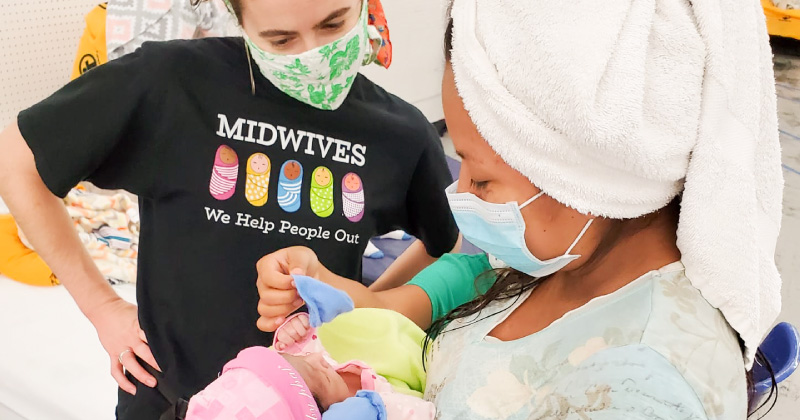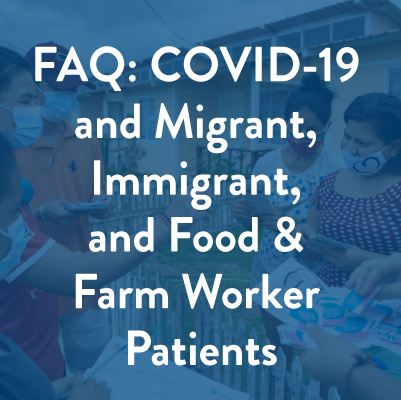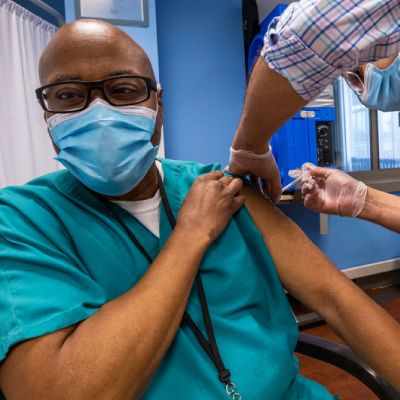- Who We Are
- Clinician Employment
- Publications
- Witness to Witness (W2W)
- Kugel & Zuroweste Health Justice Award
- Your Voice Matters: Photovoice Project
Thu, 05/06/2021 | by MCN Admin


[Editor’s Note: Health Network, MCN’s flagship virtual case management system, is a key element of several programs specifically geared to provide care for asylum-seeking mothers or mothers-to-be, and their infants and children. Support asylum-seeking mothers this week with a donation in honor of Mother’s Day through our #LaborOfLove #TrabajosDeAmor campaign, and receive an e-card to send to a mother in your own life. Learn more and donate here.]
Maria* was 36 weeks pregnant when she arrived at the immigrant shelter in McAllen, Texas, where the US-Mexico border is defined by the Rio Grande. Like so many fleeing violence, that is heightened by political and climate instability and deep poverty, Maria had fled her home in Central America and traveled over 1,500 miles north to seek asylum in the US to save her children and herself from the threat of death. After crossing the Rio Grande, she asked for asylum. She had just been released from US Customs and Border Protection (CBP) custody and given permission to travel north to her family awaiting her immigration hearing; CBP agents had dropped her off at the McAllen shelter.
Most immigrant shelters along the border provide basic essential needs: a warm bath, a hot meal, time to rest and call relatives, who purchase their bus or plane tickets. Some shelters have their own medical team or a friendly doctor on call for any urgent needs. Maria was lucky. Community for Children, Inc., a local non-profit organization, had raised funds to provide a part-time certified nurse midwife at several of the immigrant shelters nearby. Importantly, Migrant Clinician Network’s Health Network had been awarded grant funding to provide MCN’s virtual case management system to any asylum-seeking pregnant or postpartum mother arriving at the shelters.
Maria was seen by Annie, a nurse midwife, who soon assessed that Maria and her unborn baby were healthy and safe to travel. Annie then introduced Maria to Brenda, the onsite Health Network Associate, who enrolled Maria into the care coordination program for pregnant mothers. Alma, MCN’s Health Network Prenatal Coordinator, then followed up with Maria over the phone, confirming her destination city and address of her family in that city.
Then she began the search to obtain Maria an appointment near her new home as soon as possible. This is no easy feat; many clinics are reluctant to accept new patients who are already in their third trimester of pregnancy and so close to giving birth. Many of these mothers had little to no prenatal care in their home countries to assess for any abnormalities or concerns, prior to their journey to the US. Others became pregnant on the journey without the opportunity to be seen for normal prenatal screening.
After numerous follow-up calls to clinics in her destination – to convince a clinic to take her as a patient, schedule her a prenatal appointment, sign her up for sliding scale fees – and regular chats with Maria – to keep her updated on the progress, making sure no alarming changes in her pregnancy occurred in the meantime, and ensuring she had the transportation and support to attend the new appointments -- Maria arrived at her new destination and was able to establish care at a clinic within days. Maria’s healthy baby was born just a few weeks later. Maria and her infant received the appropriate screenings to rule out and treat any infections or conditions that could endanger Maria’s or her infant’s life.
Migrant Clinicians Network has established two new programs to support new mothers like Maria as well as any immigrant children who have serious medical conditions that necessitates being seen by a subspecialist upon their arrival in their destinations. Without these programs, these mothers and children would be left on their own to navigate a new country, new health care systems, and a new life.
Helping New Mothers
In August 2019, Migrant Clinicians Network partnered with the University of Texas Rio Grande Valley School of Medicine, Stanford University School of Medicine, Baylor University/Texas Children’s Hospital to form the Humanitarian Care Network for Mothers and Children. Together, they launched a pilot program specifically to provide pregnant and postpartum asylum seekers and children with serious medical conditions at the immigrant shelters with onsite medical triage and access to medical care in their destination communities through bridge case management with Health Network.
In 2020, this program served 413 pregnant and postpartum women and 225 children, helping these asylum-seeking families overcome the significant barriers to access care in their new locations and ensuring that their prenatal or infant care remained uninterrupted. With the change of administrations and policies at the border, over 300 pregnant mothers were enrolled in the first three months of 2021. In some cases, this service has been lifesaving; in less serious cases, it provided a welcome to asylum seekers who are often suffering from trauma, and provided a much-needed connection in their new communities and access to essential care that would be difficult to attain without our services. The program is growing to meet the needs of new mothers. In the coming months, this program is expanding to other immigrant shelters along the southern border with the goal to serve families with medical needs as they arrive and link them to urgent medical care at their next destination, whether they ask for asylum in Brownsville, Texas, San Diego, California, or anywhere in between.
Helping Children with Serious Medical Concerns
Some of the children who arrive at shelters after release from CBP custody have significant health issues that require extensive coordination and oftentimes urgent specialty care. In response, MCN and its partners developed a network of pediatric specialists across the country to serve needs that cannot be met by a general pediatrician – the Specialty Care Access Network (SCAN).
Samuel*, whose family recently requested asylum at the US-Mexico border, is one child who was served by SCAN. After his family was released from CBP custody, Samuel was seen by a medical provider and enrolled into Health Network. Samuel’s case was assigned to Luis, a Health Network Associate, who followed up with Samuel’s parents to let them know about the services of Health Network and SCAN. The family planned to move to the East Coast, where they had relatives. With a basic understanding of Samuel’s health concerns, Luis was able to connect Samuel directly to a local pediatric neurologist, who is a member of SCAN. Luis also assisted extensively in helping the family connect with additional services in their new clinic, such as sliding scale fees and a clinic social worker. He was also able to connect them with local immigrant support systems.
Parents of children like Samuel often struggle to access specialty care – navigating language and cultural barriers, poverty, lack of understanding of the US health system, transportation issues, migration, and more. SCAN jumpstarts their care and builds connections so that a child does not have to get worse before he gets better. With specialists acting as champions in locations across the country, SCAN stands to support children who might otherwise go without the important care they need.
Building Support Systems to Help Families Raise Healthy Children
“We care about children. We need to support families, to be able to welcome them and support them, so that the children of our future are supported,” said Marsha Griffin, MD, a former board member with MCN and the primary organizer of MCN’s efforts to serve mothers and children at the border, where she lives and works. “We want babies born healthy, with mothers being able to respond with all their spirit, not a broken spirit. We want all children with serious medical conditions cared for promptly and with love.”
“These mothers and children often have left their support systems. Our data shows that a lot of the women are first-time mothers,” Dr. Griffin added. “They’re away from their tías and abuelas, in a strange new world, after living through trauma, and now living with people they may only kind of know – and they’re about to have a baby. Anything we can do to support them to have a healthy child, to be able to nurse their children, have their basic needs met for those first critical weeks – that is critical.”
Support MCN’s programs to serve asylum seeking mothers and children here.
* Names of patients and some identifying details have been changed or anonymized for the protection of the patients.
Got some good news to share? Contact us on our social media pages above.
Return to the main blog page or sign up for blog updates here.







